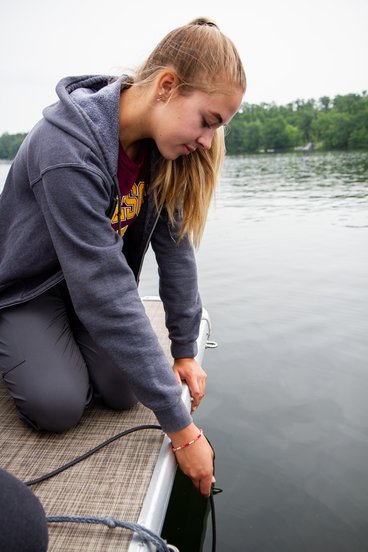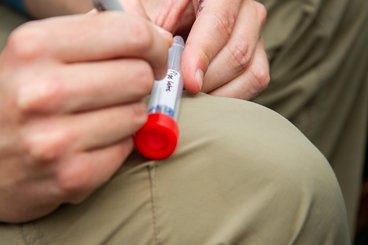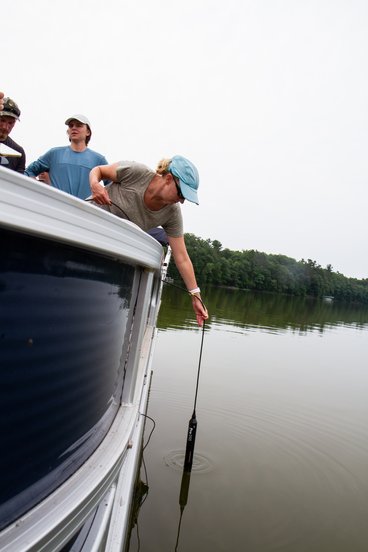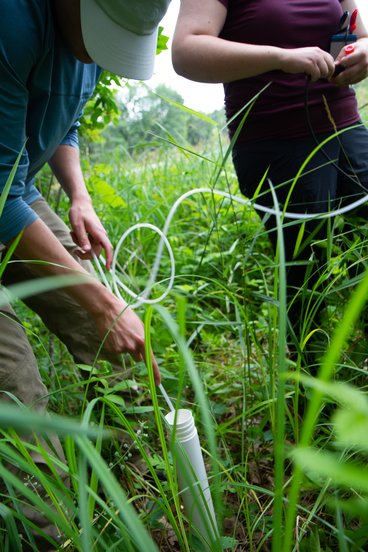
Written by Rachel Kraft Mattson
Just after 7 a.m. on a humid Wednesday morning in July, Bioproducts and Biosystems Engineering (BBE) sophomore Fayth Nystel is gathering plastic sampling bottles from the lab. She and fellow BBE Junior, Hunter Strubhart, have been working under BBE faculty member, Dr. Joe Magner, on environmental projects throughout the summer. Today they drove an hour and half east of the Twin Cities to Pipe Lake in Wisconsin, on a mission to collect surface and deep water samples to analyze later in the lab.
Once at Pipe Lake, Nystel and Strubhart met with two water quality specialists from Polk County, Katelin Anderson and Colton Sorensen; Tim Larson, the lake property owner and member of the Pipe and North Pipe Lakes Protection and Rehabilitation District; and Leslie Ludtke, a field researcher who works under Dr. Magner. Everyone boarded Larson’s pontoon and then launched off the dock to specific sampling sites around Pipe and North Pipe Lake.
“I find it so crazy that I can get all this hands-on experience so early on, and I get to do all this different work to gain experience,” said Nystel, who is on the Environmental and Ecological Engineering (EEE) track, one of the three tracks undergraduates can pursue within the BBE major.
Involving undergraduate students in field and lab work has been a part of Dr. Magner’s projects for the last decade. When asked what he hopes students take away from this work, he said a bigger kinetic picture of what Environmental and Ecological Engineering researchers do.

Strubhart seems to have found just that. “Everything that I’ve done with Joe so far seems to be directly related to what I’ll be doing in my career ahead, “ he said. “Any device I’ve learned how to use, any fieldwork I’ve done, any lab work, pretty much everything seems to be directly oriented with my career.”
Over the last 20 years, the Pipe and North Pipe Lakes Protection and Rehabilitation District has been studying and collecting data from the two lakes. In 2018, Dr. Magner and the lake district created a management plan for Pipe and North Pipe Lake, as the water quality had decreased over the years. With the help of the county, the lake district, and BBE researchers, the two lakes have had monthly surface samples collected annually.
With this information, the district, county, and researchers can get an idea of whether the nutrient values in the lakes increase or decrease. Based on those findings, the district and residents are able to implement solutions in an effort to improve the lake’s overall water quality.
The samples the team collects during the outing will be sent to labs in the BBE department and the University of Wisconsin Stevens Point. At the labs, the samples will go through isotope and nutrient testing. The isotope testing looks at the chemistry of the water molecules themselves and can provide insight around groundwater and surface water interaction, as well as the age of the water. The team also took surface water samples, which will be analyzed for different nutrients like chloride, nitrate, phosphate, and magnesium.

In addition to the surface and deep water samples, the group collected data from different depths of the lake using a water quality sonde. The sonde allows the team to record water quality measurements in-situ, or from their original depth in the lake. These measurements include pH, temperature, dissolved oxygen levels, and many others. By using a sonde on a long cord, the team is able to collect these measurements in one-meter increments, starting at the surface and moving down close to the bottom of the lake. With this tool and measuring method, they try to determine where the lakes stratify, which means where separate and distinct thermal layers of the lake appear.
A big reason this summer internship has been impactful for Strubhart is the experience directly related to his EEE track that he’s gained while at research sites.
“Without knowing what happens during fieldwork, it’s hard for you to actually analyze what you would be getting from the fieldwork that someone else is doing,” he said. “That knowledge to bridge the gap between fieldwork and analysis, and then fixing problems from that, there’d be a huge gap there if you don’t experience it yourself.”
The students gain experience in the field, but also make connections with working professionals in careers relevant to their track within BBE.
“Networking with other people, meeting new people in the field, it’s been nice getting to talk about what they do,” Nystel said.
In addition to working with professionals in positions their degree could lead to, they also get to work side-by-side with graduate students in the BBE program who are conducting their own research.
“I’ve been able to talk to a bunch of grad students I have been working with,” Nystel said. “Finding out about their time as an undergrad and how they got into it all, what they’re doing now, and what they plan to do next, it’s helped me to see what I want to do. It helps me know I’m on the right path.”
One of those graduate students working with the undergraduates is Siane Luzzi, a Ph.D. student in BBE with an emphasis in hydrogeology and nitrate tracking in water and soil.

“It’s very difficult to make a relation between what you are seeing in the classroom and what the real world requests from you,” said Luzzi, referring to the experience of doing fieldwork and analysis. “So having these outside experiences, with companies, or with grad students and professors, opens your mind.”
She said when undergraduates are involved in fieldwork, it challenges them to think critically in real time. “How they can apply the knowledge they are getting from the professors in the classroom, I think that’s the biggest benefit,” said Luzzi. “Applying and seeing how things really work, or how things do not work. Having this experience is very, very important.”
Because of this experience, both undergraduates felt more grounded in their decision to pursue the EEE track in BBE.
“This job and this summer has really allowed me to see what [EEE under] BBE truly is,” said Nystel. “Now I know this is what I want to do, and this is where I want to be.”
Strubhart felt similarly about the opportunity, “I don’t think I knew much at all before going into this summer, and now I know exactly where I want to be as far as consulting or working at a firm, or even doing more research into the future. It’s been a blast!”
If you are interested in undergraduate research and job opportunities in the BBE department, reach out to faculty members working in the areas of research in which you would like to get involved. A direct inquiry via email can provide you with additional information on finding an opportunity with hands-on experience related to your major and track.
If you or your company has an interest in providing an internship, co-op, or other employment opportunity for BBE students, please contact Ulrike Tschirner at [email protected] to find out how to get involved.